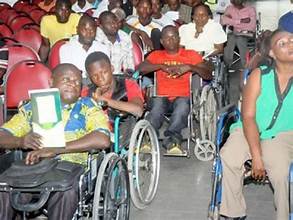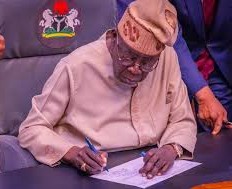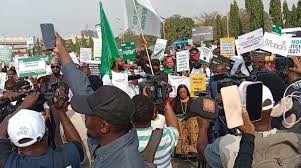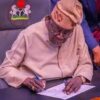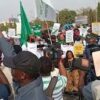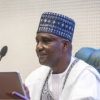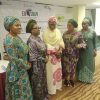PWDs Leader Backs Reserved Seats for Women, Urges Disability Inclusion A party chieftain, Mr Tolu Bankole, who serves as the All Progressives Congress (APC) National Leader for Persons with Disabilities (PWDs), has expressed support for the Reserved Seats for Women Bill and encouraged lawmakers nationwide to facilitate its passage. This view aligns with calls from
PWDs Leader Backs Reserved Seats for Women, Urges Disability Inclusion
A party chieftain, Mr Tolu Bankole, who serves as the All Progressives Congress (APC) National Leader for Persons with Disabilities (PWDs), has expressed support for the Reserved Seats for Women Bill and encouraged lawmakers nationwide to facilitate its passage. This view aligns with calls from rights advocates and political stakeholders for greater gender representation in Nigeria’s political system.
The bill, set for its third reading in October, seeks to add 37 new seats to both the Senate and House of Representatives, plus three female-only seats per state assembly. If passed, it will go to state assemblies before being sent to the President for approval.
Bankole stated that the proposed law aligns with current efforts to address gender imbalance in governance.
He observed that women currently occupy 3.7 percent of seats in Nigeria’s Senate and 3.9 percent in the House of Representatives, which is below both the recommended 35% threshold and the global average.
In his statement, Bankole praised the capacity and resilience of Nigerian women: “Women are the engine room of development. No women, no nation. Nigerian women are not only beautiful but also smart, responsive, caring, responsible, competent, and reliable. Their managerial ingenuity is both distinguished and honourable.”
He noted that greater participation of women in governance could contribute to decision-making, encourage innovation, and promote equal representation within Nigeria’s democratic processes.
Going beyond gender, Bankole urged lawmakers to adopt a broader lens of inclusivity by extending affirmative action to Persons with Disabilities. He emphasised that just as women deserve recognition and representation, PWDs remain one of the most marginalised groups in society, despite their potential to contribute meaningfully to nation-building.
“I respectfully urge our distinguished legislators to pass this all-important bill without delay and to extend the same treatment to Persons With Disabilities, who remain among the most vulnerable in our society,” he said.
Also, he highlighted that women and PWDs share a common struggle against systemic exclusion and stereotypes. He argued that affirmative action for PWDs is not merely about compassion but about unlocking the skills, creativity, and insights of millions of Nigerians currently sidelined by structural barriers. “Affirmative action for PWDs is not just an act of compassion but a national imperative,” he stated.
However, his remarks tie into a larger debate about inclusive governance in Nigeria, where both women and PWDs have long been underrepresented. Many African nations, like Rwanda and Senegal, have increased women’s legislative representation through quotas, but Nigeria has not kept pace.
Why the Bill Matters
Nigeria has consistently lagged behind global and regional averages in female political participation. While countries such as Rwanda, Senegal, and South Africa have achieved significant gains through quota systems, Nigeria has yet to adopt structural reforms to change its political culture.
Greater female representation would introduce varied perspectives, enhance accountability, and reduce the dominance of male-centric policymaking. It will advance Nigeria’s socioeconomic agenda.
However, extending affirmative action to vulnerable groups would signal a more inclusive democracy where every Nigerian, regardless of gender or disability, has a voice. When the bill is passed, it will yield changes beyond politics.
For now, all eyes remain on the National Assembly and state lawmakers, whose decisions in the coming weeks will determine whether Nigeria finally embraces legislative measures to bridge its long-standing gender gap and possibly set a precedent for PWD representation.

